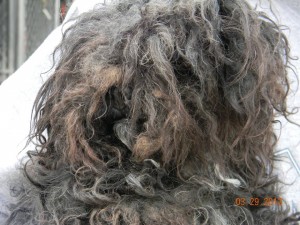What To Say, And What Not To Say, Following the Passing of a Pet
Guest post by Steven May
If you were to ask a veterinarian
or vet assistant what the hardest part of their job is most would quickly say
the end of life process. These
professionals have committed themselves to the pursuit of keeping pets healthy
but are often relegated with the difficult task of leading pet owners through
the process of euthanasia or breaking the bad news that they were unsuccessful
in saving a pet.
As we know, death is inevitable. And
with the relatively short life span of most animals, the passing of a pet is
something that comes with the territory. But no matter how logically we
approach the situation or how prepared we are, losing a pet can be a
heartbreaking and traumatic experience.
Throughout my long career working
with both pets and owners I’ve assisted in more than 3,000 euthanasias and
have been present in countless situations where a pet has passed due to natural
or unnatural causes. And no matter how
many times I go through the process it is never easy. The loss of a pet hurts. They
remind us of milestones in our lives and often represent the true meaning of “unconditional love.”
But
not everyone understands the bond that pet owners have for their animals. Some
have never enjoyed the unique benefits that come from owning a pet and
therefore may not appropriately understand the grief that comes with a loss.
So what do we say to a person who
has lost a pet? And, just as importantly, what do we not say?
Say This
“Your pet was so lucky to have you.” During times of grief many people
look inward and ask themselves if there was anything else they could have done
differently. Reminding someone of what a wonderful pet parent they were, and
that their pet enjoyed the best life possible, can help to alleviate any guilt
a pet owner may be feeling.
Don’t Say This -
“When are you getting another pet?” This implies that a pet is like a
piece of furniture. If it breaks or gets old you just throw it out and get a
new one. Nothing could be further from the truth. Our pets provide the kind of
emotional connection that, for some, can resonate deeper than what they feel
with human beings. Pets demand that we be selfless and in return we are
rewarded with unconditional love. That’s not something that can be erased
immediately.
Say This
“Do you remember when…?” Sharing a personal, heartwarming
or funny story about a pet with a grieving owner can help move the focus away
from the loss to a remembrance of happier times. And it’s those happy times that will help
many pet owners get through the tough times ahead.
Don’t Say This
“What’s the big deal? You
have other pets.” As any pet owner will tell you
each pet is different and brings something unique to our lives. Would you tell
a parent that has lost a child, “Don’t worry about it. You have other kids?” Of
course not. Be sensitive to the loss irrespective of how many pets a person
might have.
Say This
“Is there anything I can do?” It might sound cliché but if it’s
truthful, and you’re willing to help, just knowing there is someone there if
needed can provide a great deal of comfort to a grieving pet parent. But if you say it you need to mean it. If
someone reaches out to you with a request after you’ve offered, and you’re not
able or willing to help, you can damage a relationship forever.
Don’t Say This
“Are you really going to have it cremated?” Just like it is with the passing
of people, everyone has their own particular desires for how to handle the
services. In the case of pets, cremation allows us to ‘keep’ our pet with us
forever. By implying to someone that their choice of cremation is foolish
speaks to a personality void of understanding the desire for some type of
physical presence.
Say This
“You did everything you could do.” Many pet owners feel enormous
guilt upon the passing of the pet. Perhaps they feel if they’d taken their pet
to the vet earlier the outcome may have been different. Guilt is also often
felt when it comes to end of life decisions, one of the hardest things a pet
owner may have to go through. Letting the pet owner know they responded
appropriately and with love can go a long way in helping to sooth a grieving
owner.
Don’t Say This
“It’s just a dog (cat, rabbit, hamster, etc.)” This will invariably come from
the person who has never owned a pet. They can’t begin to understand the
connection we feel with our pets and probably don’t view this statement as
crass or insensitive. But you have to wonder if they would say the same kind of
thing if they were talking about a family member or friend passing.
Do This
Sending a condolence card will be
seen by most any grieving pet owner as a very thoughtful act. This is
not the
time for an email which is impersonal. Include a brief, handwritten note and
include a photo of the pet in happier times if you have one. Another kind gesture is to make donation to a
pet charity in the name of the owner. If the dog or cat died from cancer a
donation to the Animal Cancer Fund or other worthy organization can mean the
world to a grieving pet parent.
The bond we have with our
pets runs deep. And one of the hardest parts about owning a pet is that we know
the odds are that we’ll outlive them. But in the relatively brief time we have
our beloved friends we know the joy they bring and we’re willing to deal with
that reality. Death is a part of life
and eventually we move on. But that doesn’t negate the finality that comes with
death; particularly in the days after. Showing the same type of sensitivity to
someone who has lost a pet as we would if it was a relative or friend who has
passed not only helps to alleviate grieving it also reminds us of the fragility
of life. And if that doesn’t make you want to hug your pet a little tighter I’m
not sure what will.



Wonderful tips. I always found it awkward trying to come up with something to say to owners after euthanasia. I have used your suggestions in the past which are all very thoughtful things to say.
Very good advice. These are our precious babies and I am glad Steven shared this tips.
This article is spot on and I will be sharing it with lots of people. Our animal companions are family. I had a boss many years ago who let me take off a day to grieve when my beloved cat Kia passed away. I will never forget her kindness to me during that time. – Paige
Except for the cremation one, I can’t imagine any human saying the “don’t say this” phrase. I know absolutely no one, with or ..without a pet, in my life that would ever say something so cold. It’s a sad state of things if people would actually say that
Wonderful suggestions. I, unfortunately, have heard humans saying those heartless things, sometimes to or about people who have lost human family members. Another piece of advice: do not question how or how long someone is grieving. Each of us has his ow way and it’s right for him, regardless of how someone else would handle the same situation.
Hi Steven,
It’s a very sensitive time to a cat parent. The parent is broken and vulnerable.
When it happens I feel devastated.
That’s a good list of what to say and what not to say.
I’m sure it works well for most but I might be a little different. I prefer not to have anyone say or do anything.
I tell my family ahead of time that I will tell them when it has happened but not to comment except to say “sorry”. That works best for me.
I also tell the vet not to say anything. All but one of them have respected my wish. One was thought she had to deliver something of a sermon. I realize she was trying to be helpful and I appreciate her intent. But I had just gotten done telling her not to comment and she did upset me by commenting anyhow.
I think the “What not to say” bits are quite good though and I’m glad you’ve addressed the issue as it is very important and doesn’t get much attention.
Thanx for the article,
=^-^= Hairless Cat Girl =^-^=